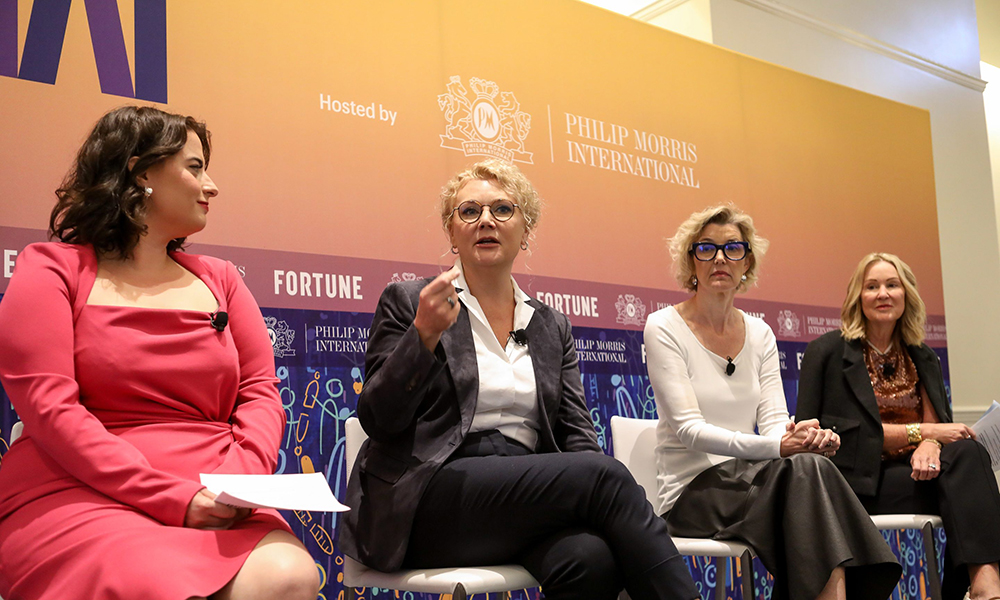
Ellevest联合创始人兼首席执行官萨利·克罗切克表示:“企业或机构会在员工不在场的情况下进行有关员工职业发展的重要决策。”这也是为什么打造有分量的个人品牌至关重要。
在MPW女性峰会的“雄韬伟略:商业与个人品牌的交汇点”(Bold Visions:The Intersection of Business and Personal Branding)研讨会上,克罗切克与菲利普莫里斯国际公司(Philip Morris International)美洲地区总裁兼美国业务首席执行官史黛西·肯尼迪和Adecco 集团美国基金会主席乔伊斯·罗素一道,探讨如何实施切实可行的举措,来打造真实、有韧性的个人品牌,从而为职业发展铺平道路。
不管你看中的是董事会职务亦或刚好希望在职业发展方面采取下一步行动,与会嘉宾们认为,个人品牌并非只是一个潮词,它是通往成功的重要工具。以下是领导者认为人们在打造个人品牌时应注意的五个方面:
1.监测你的“数字尾气”
如果人们在打造个人品牌方面不知该从何做起,罗素表示,一开始可以看看自己所谓的“数字尾气”,也就是自己在线上的痕迹。
自己的社交媒体资料是如何介绍自己的?谷歌搜索中都有自己的什么内容?完成这项举措时头脑中浮现的这些关键词可以为个人品牌打造指明正确的方向。
为了向大众展示如何操作,罗素查看了《财富》杂志记者、主持人艾丽·加芬克尔的社交媒体账号。根据加芬克尔的“数字尾气”,罗素想到了“好奇”和“智慧”这两个词,并将其作为初始关键词。她表示,这些举措对于自身专长定位自身和品牌打造来说是非常好的起点,或者至少能了解当前他人对自己的看法。
2.填空,“我是一个(什么样)的人。”
另一个打造有分量个人品牌的举措就是发现自己拥有哪些独特技能或能力。不妨问自己,希望因什么而被人们熟知。克罗切克表示:“她是一个(什么样)的人,把空填上。”
这三位嘉宾都表示,个人品牌能够而且大概率随着人生阶段的不同而改变。在其职业初期,克罗切克给自己的定位是“在投资某支股票前必须咨询的人”。如今,她成为了通过Ellevest“帮助女性获取财富的人”。
克罗切克表示:“如果成功了,他们就会一个劲地说‘你是一个(什么样)的人’,然后你就获得了一个非常成功的个人品牌。”
3.接受针对你的人
一旦你的个人品牌成功之后,你便会脱颖而出。在你脱颖而出之后,你可能会发现总有人针对你,与你唱反调。嘉宾们表示,不要纠结于仇恨,因为它迟早会出现。
克罗切克在讨论正面和负面公众关注度时表示:“我曾两次登上《财富》杂志,与此同时,我被炒鱿鱼的消息曾两度登上报纸头版。第一次经历这种事情真的是太有趣了,我当时想,完全可以再来一次。”说完她付诸一笑。
克罗切克并不在意这些负面看法,她将此戏称为在别人头脑中“免费居住”。她说:“接受那些针对你的人,压力是一种特权。”
4.保持真我
真实性是确保个人品牌适合自己的关键因素。
罗素表示:“人们必须展现真实的自我。”她还称自己的职业发展靠的是PIE,也就是专业表现(performance)、个人形象(image)和曝光度(exposure)的英文缩写。这个理论说明,个人工作表现、人们对你的看法以及个人获得的学习机会,是个人职业发展和进步的关键。
罗素强调,你的形象,也就是字母“I”,是你的个人品牌。无论在哪个公司工作,它都应该是你个人的真实展现。
5.拒绝冒充者综合症(自我能力否定倾向——译者注)
人们很容易患上冒充者综合症,尤其是在职业初期。然而,罗素询问观众,“如果你不能胜任,谁能?”
肯尼迪还提到了她推崇的白名单举措,也就是写下某个局势中可能出现的最好结果和最坏结果,以及你所掌握的导致上述两种结果的证据。她经常发现,人们大部分时候会自己吓自己,并因此而畏缩不前。白名单会告诉你,你比自己想象的更胜任,更有能力。将自己希望的未来和选择可视化,可以帮助你走上成功之路。
另一方面,克罗切克称,她不会让自己患上冒充者综合症。她提到在职业生涯初期,她的男同事会将侮辱性极强的图片放在自己桌上,并想尽一切办法将她这样的女性赶出金融圈。
克罗切克称自己意识到:“我比他们聪明,但他们是业界的主宰者。我可以打败他们。”
这种心态帮助她克服了当时感觉到的各种冒充者综合症,并帮助其塑造了个人品牌,因为她知道自己是一个有价值的人,即便在与不良行为做斗争时亦是如此。(财富中文网)
译者:冯丰
审校:夏林
Ellevest联合创始人兼首席执行官萨利·克罗切克表示:“企业或机构会在员工不在场的情况下进行有关员工职业发展的重要决策。”这也是为什么打造有分量的个人品牌至关重要。
在MPW女性峰会的“雄韬伟略:商业与个人品牌的交汇点”(Bold Visions:The Intersection of Business and Personal Branding)研讨会上,克罗切克与菲利普莫里斯国际公司(Philip Morris International)美洲地区总裁兼美国业务首席执行官史黛西·肯尼迪和Adecco 集团美国基金会主席乔伊斯·罗素一道,探讨如何实施切实可行的举措,来打造真实、有韧性的个人品牌,从而为职业发展铺平道路。
不管你看中的是董事会职务亦或刚好希望在职业发展方面采取下一步行动,与会嘉宾们认为,个人品牌并非只是一个潮词,它是通往成功的重要工具。以下是领导者认为人们在打造个人品牌时应注意的五个方面:
1.监测你的“数字尾气”
如果人们在打造个人品牌方面不知该从何做起,罗素表示,一开始可以看看自己所谓的“数字尾气”,也就是自己在线上的痕迹。
自己的社交媒体资料是如何介绍自己的?谷歌搜索中都有自己的什么内容?完成这项举措时头脑中浮现的这些关键词可以为个人品牌打造指明正确的方向。
为了向大众展示如何操作,罗素查看了《财富》杂志记者、主持人艾丽·加芬克尔的社交媒体账号。根据加芬克尔的“数字尾气”,罗素想到了“好奇”和“智慧”这两个词,并将其作为初始关键词。她表示,这些举措对于自身专长定位自身和品牌打造来说是非常好的起点,或者至少能了解当前他人对自己的看法。
2.填空,“我是一个(什么样)的人。”
另一个打造有分量个人品牌的举措就是发现自己拥有哪些独特技能或能力。不妨问自己,希望因什么而被人们熟知。克罗切克表示:“她是一个(什么样)的人,把空填上。”
这三位嘉宾都表示,个人品牌能够而且大概率随着人生阶段的不同而改变。在其职业初期,克罗切克给自己的定位是“在投资某支股票前必须咨询的人”。如今,她成为了通过Ellevest“帮助女性获取财富的人”。
克罗切克表示:“如果成功了,他们就会一个劲地说‘你是一个(什么样)的人’,然后你就获得了一个非常成功的个人品牌。”
3.接受针对你的人
一旦你的个人品牌成功之后,你便会脱颖而出。在你脱颖而出之后,你可能会发现总有人针对你,与你唱反调。嘉宾们表示,不要纠结于仇恨,因为它迟早会出现。
克罗切克在讨论正面和负面公众关注度时表示:“我曾两次登上《财富》杂志,与此同时,我被炒鱿鱼的消息曾两度登上报纸头版。第一次经历这种事情真的是太有趣了,我当时想,完全可以再来一次。”说完她付诸一笑。
克罗切克并不在意这些负面看法,她将此戏称为在别人头脑中“免费居住”。她说:“接受那些针对你的人,压力是一种特权。”
4.保持真我
真实性是确保个人品牌适合自己的关键因素。
罗素表示:“人们必须展现真实的自我。”她还称自己的职业发展靠的是PIE,也就是专业表现(performance)、个人形象(image)和曝光度(exposure)的英文缩写。这个理论说明,个人工作表现、人们对你的看法以及个人获得的学习机会,是个人职业发展和进步的关键。
罗素强调,你的形象,也就是字母“I”,是你的个人品牌。无论在哪个公司工作,它都应该是你个人的真实展现。
5.拒绝冒充者综合症(自我能力否定倾向——译者注)
人们很容易患上冒充者综合症,尤其是在职业初期。然而,罗素询问观众,“如果你不能胜任,谁能?”
肯尼迪还提到了她推崇的白名单举措,也就是写下某个局势中可能出现的最好结果和最坏结果,以及你所掌握的导致上述两种结果的证据。她经常发现,人们大部分时候会自己吓自己,并因此而畏缩不前。白名单会告诉你,你比自己想象的更胜任,更有能力。将自己希望的未来和选择可视化,可以帮助你走上成功之路。
另一方面,克罗切克称,她不会让自己患上冒充者综合症。她提到在职业生涯初期,她的男同事会将侮辱性极强的图片放在自己桌上,并想尽一切办法将她这样的女性赶出金融圈。
克罗切克称自己意识到:“我比他们聪明,但他们是业界的主宰者。我可以打败他们。”
这种心态帮助她克服了当时感觉到的各种冒充者综合症,并帮助其塑造了个人品牌,因为她知道自己是一个有价值的人,即便在与不良行为做斗争时亦是如此。(财富中文网)
译者:冯丰
审校:夏林
From Left to Right: Allie Garfinkle, Senior Reporter, Finance, Fortune; Stacey Kennedy, President, Americas; Chief Executive Officer, U.S. Business, Philip Morris International Sallie Krawcheck, Co-founder and CEO, Ellevest Joyce Russell, President, Adecco Group US Foundation.
Ellevest co-founder and CEO Sally Krawcheck says, “Every important decision about your career is made when you’re not in the room.” And that’s why having a strong personal brand is critical.
At the Most Powerful Women (MPW) conference’s Bold Visions: The Intersection of Business and Personal Branding panel, Krawcheck joined Stacey Kennedy, President of Americas and CEO of U.S. Business at Philip Morris Internationa, and Joyce Russell, President of Adecco Group US Foundation, to discuss actionable steps to create authentic, resilient personal brands that pave the way for career growth.
Whether you’re aiming for a boardroom position or just looking to make your next career move, the panelists agreed that personal branding isn’t just a buzzword; it’s a crucial tool for success. Here are five key takeaways from the leaders when considering your personal brand:
1.Monitor your “digital exhaust”
If you’re not sure where to start building your personal brand, Russell says a key place to begin is to look at your so-called “digital exhaust” aka what’s out there about you online.
What do your social media profiles say about you? What does a quick Google search reveal? Some of the keywords that come to mind when completing this exercise could point you in the right direction for your brand.
In an exercise for the crowd, Russell looked at the social media accounts for moderator Allie Garfinkle, a Fortune reporter. Russell came up with the terms “curious” and “intelligent” as starting keywords based on Garfinkle’s digital exhaust. She said these exercises are great as a starting point for framing your expertise and branding, or at least understanding how you’re currently perceived.
2.Fill in the blank “I am the person who ___”
Another exercise to build a strong personal brand is to identify what unique skills or offerings you bring to the table. It helps to ask what you want to be known for.
“She’s the person who… fill in the blank,” Krawcheck said.
All three panelists noted that your personal brand can, and probably will, change over your life. Early in her career, Krawcheck viewed herself as “the person you must speak to before you invest in this stock.” Now she’s “the person who helps women gain wealth” with Ellevest.
“If you can make it so they only say it about you, ‘you are the one who,’ then you have a very successful personal brand,” Krawcheck said.
3.Embrace the haters
When your branding is working, you’ll start to stand out. And when you start to stand out, you might notice you start getting haters or naysayers. Panelists on Monday said not to get too stuck on the hate, because it will always show up.
“I’ve been on the cover of Fortune twice, but I’m also the only person who has been fired on the front page of the newspaper twice,” Krawcheck said discussing public attention–both positive and negative before adding to laughs. “It was so fun the first time, I was like, let’s do it all over again.”
Krawcheck shrugged off the negativity joking about “living rent-free” in people’s brains. “Embrace the haters,” she said. “Pressure’s a privilege.”
4.Stay authentic
Authenticity is key to making sure your branding works for you.
“You have to be really authentic,” Russell said, adding that she leans on the PIE acronym for career advancement. PIE references performance, image, and exposure. That theory says a combination of your work performance, how people perceive you, and the learning opportunities you’re given are key to growing and advancing your career.
Russell emphasized that your image, the ‘I’, is your personal branding. That should be true to you regardless of the company you work at.
5.Say no to imposter syndrome
Imposter syndrome is easy to have, especially early on in your career. But Russell asked the audience, “if not you, then who?”
Kennedy also mentioned a white sheet exercise she recommends where you write the best possible and worst possible outcomes of a scenario and any evidence you have for either outcome. Typically, she finds that a lot of what holds people back is a story they’ve created in their head, and a white paper will reveal that you’re more qualified and capable than you think. Visualizing the future and choices you want to make, can also help set you up for success.
Krawcheck on the other hand said she just doesn’t allow herself to feel imposter syndrome. She mentioned that early on in her career, she worked with men who would leave photocopies of their genitals on her desk and actively sought to push women like her out of the financial world.
“But I was smarter than them,” Krawcheck said she realized. “They are no smarter than I am and they’re the masters of the universe. And I can outwork them.”
That mentality helped her move beyond any imposter syndrome she felt at the time. It also shaped her brand as she understood she had something valuable to offer even when up against toxicity.






